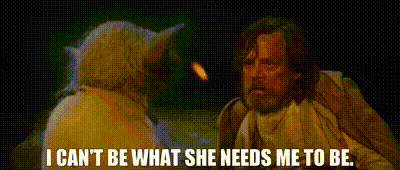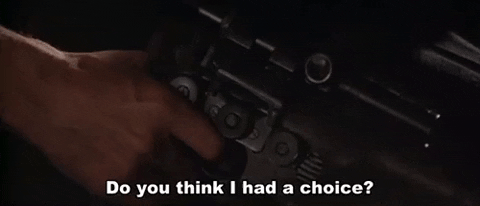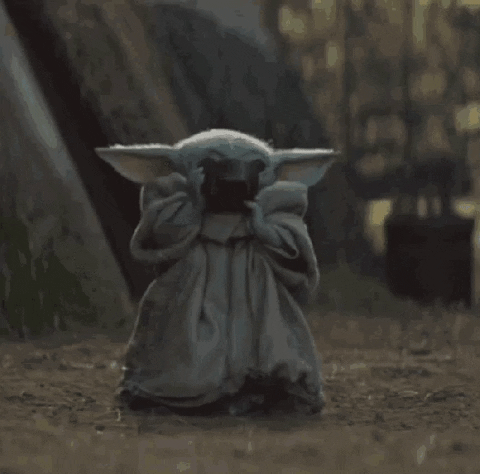JOSEPH CAMPBELL:
A ritual is the enactment of a myth.
By participating in a ritual, you are participating in a myth.
BILL MOYERS:
And what does it mean, do you think, to young boys today. that we are absent these myths?
JOSEPH CAMPBELL:
Well, the confirmation ritual is the counterpart today of these rites.
As a little Catholic boy, you choose your confirmed name, the name you’re going to be confirmed by, and you go up.
But instead of having them scarify you, knock your teeth out and all, the bishop gives you a mild slap on the cheek.
It’s been reduced to that, and
nothing’s happened to you.
The Jewish counterpart is the bar mitzvah, and whether it works actually to effect a psychological transformation, I suppose, will depend on the individual case.
There was no problem in these old days.
The Boy came out with a different body, and
He’d Gone Through Something.
INT. KITCHEN - NIGHT
Cornelius and Tyler each stir a boiling pot.
Cornelius (V.O.):
Tyler was full of useful information.
TYLER :
Ancient peoples found that clothes got clean when they washed them at certain points in the river.
Do you know why?
CORNELIUS :
No
Tyler gestures for Jack to come over
TYLER:
Human sacrifices were once made on the hills above this river.
Bodies burned, water seeped into ashes to make lye. This is lye, a crucial ingredient.
Once it mixed with the melted fat of the bodies a thick, white soapy discharge crept into the river.
Let me see your hand please.
Tyler licks his lips until they're gleaming wet. He takes Jack's hands and KISSES the back of it.
CORNELIUS :
What is this?
TYLER:
This, is a Chemical Burn.
The saliva shines in the shape of the kiss.
Tyler pours a bit of the flaked lye onto CORNELIUS’ hand. CORNELIUS’ whole body JERKS. Tyler holds tight to CORNELIUS’ hand and arm. Tears well in CORNELIUS’ eyes; his face tightens.
TYLER:
It will hurt more than you've ever been burned. And you will have a Scar.
CORNELIUS (V.O.):
Guided meditation worked for cancer, it could work for this.
SHOT OF A FOREST, IN GENTLE SPRING RAINFALL. RESUME:
TYLER:
Stay with The Pain, don’t block this out.
Tyler JERKS CORNELIUS’ hand, getting CORNELIUS’ attention…
TYLER:
Look at your hand.
The first soap was made from the ashes of heroes.
Like the first monkeys shot into space.
Without Pain, without Sacrifice, we would have NOTHING!
CORNELIUS (V.O.):
I tried not to think of the words "searing" or "flesh."
SHOT OF A FOREST, IN GENTLE SPRING RAINFALL. RESUME:
TYLER: •STOP•. This is Your Pain, This is Your Burning Hand. It’s right here!
JACK: I’m going to My Cave. I’m going to My Cave, I’m going to find My Power Animal !! —
SHOT OF INSIDE THE ICE CAVE - ON MARLA, LYING NAKED UNDER A FUR COAT, TURNING HER HEAD TO LOOK TOWARDS US. RESUME:
TYLER: NO! Don’t deal with it like those dead people do. Come on!
CORNELIUS : I get The Point!
TYLER: No what you’re feeling is premature Enlightenment.
SHOT OF INSIDE ICE CAVE - NAKED MARLA PULLS CORNELIUS DOWN ON TOP OF HER - CORNELIUS KISSES HER - CIGARETTE SMOKE COMES FROM HER MOUTH - CORNELIUS COUGHS. RESUME:
Tyler SLAPS CORNELIUS’ face, regaining his attention…
TYLER: This is The Greatest Moment of Your Life, man! And you’re off somewhere missing it.
CORNELIUS,, snapping back, tries to jerk his hand away. Tyler keeps hold of it and their arms KNOCK UTENSILS off the table.
CORNELIUS :
No I’m not!
TYLER:
•SHUT UP•
Our Fathers were our models for God — if Our Fathers bailed, WHAT DOES THAT TELL YOU ABOUT GOD....?
Tyler SLAPS CORNELIUS’ face again…
TYLER:
•Listen to Me.•
You have to consider the possibility that God DOES NOT LIKE YOU, he never WANTED You –– In all probability, He HATES You.
This is Not The Worst Thing That Can Happen.....
JACK: It isn’t…?
TYLER:
We don’t need him.
Fuck damnation. Fuck redemption. We are God's Unwanted Children?
¡¡ SO BE IT !!
CORNELIUS looks at Tyler -- they lock eyes. CORNELIUS does his best to stifle his spasms of pain, his body a quivering, coiled knot. He bolts toward the sink, but Tyler holds on.
TYLER:
Listen. You can run water over your hand and make it worse, OR -- Look at Me! -- OR, you can use Vinegar and neutralize The Burn.
TYLER: First, you •HAVE• to give up —
First you have to KNOW, not fear, •KNOW• That Some Day You Will Die ––
CORNELIUS :
You don’t know how this feels!
Tyler shows CORNELIUS a LYE-BURNED KISS SCAR on his own hand. Tears begin to drip from CORNELIUS' eyes.
TYLER:
It’s Only After We’ve Lost Everything,
That We’re Free to Do Anything.
Tyler grabs a bottle of VINEGAR -- pours it over CORNELIUS' wound.
TYLER:
Congratulations –– You’re one step closer to hitting Rock Bottom
BILL MOYERS: You visited some of the great painted caves in Europe.
JOSEPH CAMPBELL: Oh, yes.
BILL MOYERS: Tell me what you remember when first you looked upon those underground caves.
JOSEPH CAMPBELL: Well, you didn’t want to leave. Here you come into an enormous chamber, like a great cathedral, with these animals painted. And they’re painted with a life like the life of an ink on silk, the Japanese painting. And well, you realize the darkness is inconceivable. We’re there with electric lights, but in a couple of instances, the concierge, the man who was showing us through, turned off the lights and you were never in darker darkness in your life. It’s like a, I don’t know, just a complete knockout of, you don’t know where you are, whether you’re looking north, south, east or west. All orientation is gone, and you’re in a darkness that never saw the sun. Then they tum the lights on again, and you see these gloriously painted animals. A bull that will be 20 feet long, and painted so that the haunches will be represented by a swelling in the rock, you know, they take account of the whole thing. It’s incredible.
BILL MOYERS: Do you ever look at these primitive art objects, and think not of the art but of the man or woman standing there, painting or creating? I find that’s where I speculate.
JOSEPH CAMPBELL: Oh, this is what hits you when you go into those caves, I can tell you that. What was in their mind when they were doing that? And that’s not an easy thing to do. And how did they get up there? And how did they see anything? And what kind of light did they have the little flashing torches throwing flickering things on it, to get something of that grace and perfection? And with respect to the problem of beauty, is this beauty intended, or is this something that is the natural expression of a beautiful spirit. You know what I mean? When you hear a bird sing, the beauty of the bird’s song, is this intentional, in what sense is it intentional? But it’s the expression of the bird, the beauty of the bird’s spirit, you might almost say, and I think that way very often about
this art. To what degree was the intention of the artist, what we would call “aesthetic,” or to what degree expressive, you know, and to what degree something that they simply had learned to do that way? It’s a difficult point. When a spider makes a beautiful web, the beauty comes out of the spider’s nature, you know, it’s instinctive beauty. And how much of the beauty of our own lives is the beauty of being alive, and how much of it is conscious intention? That’s a big question.
BILL MOYERS: You call them temple caves.
JOSEPH CAMPBELL: Yes.
BILL MOYERS: Why temple?
JOSEPH CAMPBELL: Temple with images and stained glass windows, cathedrals, are a landscape of the soul. You move into a world of spiritual images, that’s what this is. When lean and I, my wife and I, drove down from Paris to this part of France, we stopped off at Chartres Cathedral. There is a cathedral. When you walk into the cathedral, it’s the mother, womb of your spiritual life Mother church All the forms around are significant of spiritual values, and the imagery is in anthropomorphic form God and Jesus and the saints and all, in human form.
BILL MOYERS: In human form.
JOSEPH CAMPBELL: Then we went down to the Lascaux. The images were in animal form. The form is secondary; the message is what’s important
BILL MOYERS: And the message of the cave?
JOSEPH CAMPBELL: The message of the cave is of a relationship of time to eternal powers that is somehow to be experienced in that place. Now, I tell you, when you’re down in those caves, it’s a strange transformation of consciousness you have. You feel this is the womb, this is the place from which life comes, and that world up there in the sun with all those … that’s a secondary world: this is primary. I mean, this just overcomes you.
BILL MOYERS: You had that feeling when you were there?
JOSEPH CAMPBELL: I had it every time. Now, what were these caves used for? The speculations that are most common of scholars interested in this, is that they had to do with the initiation of boys into the hunt. You go in there, it’s dangerous, it’s very dangerous. It’s completely dark. It’s cold and dank. You’re banging your head on projections all the time, and it was a place of fear. And the boys were to overcome all that, and go into the womb of the earth. And the shaman, or whoever it was that would be helping you through, would not be making it easy.
BILL MOYERS: And then there was a release, once you got into that vast, torchlit chamber down there. What was the tribe, what was the tradition trying to say to the boy?
JOSEPH CAMPBELL: That is the womb land from which all the animals come.
BILL MOYERS: I see.
JOSEPH CAMPBELL: And the rituals down there have to do with the generation of a situation that will be propitious for the hunt. And the boys were to learn not only to hunt, but how to respect the animals and what rituals to perform, and how in their own lives no longer to be little boys but to be men. Because those hunts were very, very dangerous hunts, believe me, and these are the Original men’s rile sanctuaries, when: the boys became no longer their mothers’ sons, but their fathers’ sons.
BILL MOYERS: Don’t you wonder what effect this had on a boy?
JOSEPH CAMPBELL: Well, you can go through it today, actually, in cultures that arc still having the initiations with young boys. They give them an ordeal, a terrifying ordeal, that the youngster has to survive, makes a man of him, you know.
BILL MOYERS: What would happen to me as a child, if I went through one of these rites, as far as we can…
JOSEPH CAMPBELL: Well, we know what they do in Australia. Now, when a boy gets to be, you know, a little bit ungovernable, one fine day the men come in, and they’re naked except for stripes of white down that has been stuck on their bodies, and stripes with their men’s blood. They used their own blood for gluing this on. And they’re swinging the bull-roarers, which are the voice of the spirits, and they come as spirits. The boy will try to take refuge with his mother; she’ll pretend to try to protect him. The men just take him away, a mother’s no good from then on, you see, he’s no longer a little boy. He’s in the men’s group, and then they put him really through an ordeal. These are the rites, you know, of circumcision, subincision, and so forth.
BILL MOYERS: And the whole purpose is to…
JOSEPH CAMPBELL: Tum him into a member of the tribe.
BILL MOYERS: And a hunter.
JOSEPH CAMPBELL: And a hunter.
BILL MOYERS: Because that was the way of life.
JOSEPH CAMPBELL: Yeah, but most important is to live according to the needs and values of that tribe. He is initiated in a Short period of time into the whole culture context of his people.
BILL MOYERS: So myth relates directly to ceremony and tribal ritual, and the absence of myth can mean the end of ritual.
JOSEPH CAMPBELL: A ritual is the enactment of a myth. By participating in a ritual, you are participating in a myth.
BILL MOYERS: And what does it mean, do you think, to young boys today. that we are absent these myths?
JOSEPH CAMPBELL: Well, the confirmation ritual is the counterpart today of these rites. As a little Catholic boy, you choose your confirmed name, the name you’re going to be confirmed by, and you go up. But instead of having them scarify you, knock your teeth out and all, the bishop gives you a mild slap on the cheek. It’s been reduced to that, and nothing’s happened to you. The Jewish counterpart is the bar mitzvah, and whether it works actually to effect a psychological transformation, I suppose, will depend on the individual case. There was no problem in these old days. The boy came out with a different body, and he’d gone through something.
BILL MOYERS: What about the female? I mean, most of the figures in the temple caves arc male. Was this a kind of secret society for males only?
JOSEPH CAMPBELL: It wasn’t a secret society, it was that the boys had to go through it. Now, we don’t know exactly what happens with the female in this period, because we have very little evidence to tell us. In primary cultures today, the girl becomes a woman with her first menstruation. It happens to her; I mean, nature does it to her. And so she has undergone the transformation, and what is her initiation? Typically it is to sit in a little hut for a certain number of days, and realize what she is.
BILL MOYERS: How does she do that?
JOSEPH CAMPBELL: She sits there. She’s now a woman. And what is a woman? A woman is a vehicle of life, and life has overtaken her. She is a vehicle now of life. A woman’s what it’s all about; the giving of birth and the giving of nourishment. She’s identical with the earth goddess in her powers, and she’s got to realize that about herself. The boy does not have a happening of that kind. He has to be turned into a man, and voluntarily become a servant of something greater than himself. The woman becomes the vehicle of nature; the man becomes the vehicle of the society, the social order and the social purpose.
BILL MOYERS: So what happens when a society no longer embraces powerful mythology?
JOSEPH CAMPBELL: What we’ve got on our hands. As I say, if you want to find what it means not to have a society without any rituals, read The New York Times.
BILL MOYERS: And you’d find?
JOSEPH CAMPBELL: Well, the news of the day.
BILL MOYERS: Wars…
JOSEPH CAMPBELL: Young people who don’t know how to behave in a civilized society. Half the…I imagine that 50% of the crime is by young people in their 20s and early 30s that just behave like barbarians.
BILL MOYERS: Society has provided them no rituals by which they become members.
JOSEPH CAMPBELL: None. There’s been a reduction, a reduction, a reduction of ritual. Even in the Roman Catholic Church, my God, they’ve translated the Mass out of the ritual language into a language that has a lot of domestic associations. So that, I mean, every time now that I read tile Latin of the Mass, I get that pitch again that it’s supposed to give, a language that throws you out of the field of your domesticity, you know. The altar is turned so that the priest, his back is to you, and with him you address yourself outward like that. Now they’ve turned the altar around, looks like Julia Child giving a demonstration, and it’s all homey and cozy.
BILL MOYERS: And they play a guitar.
JOSEPH CAMPBELL: They play a guitar. Listen, they’ve forgotten what the function of a ritual is, is to pitch you out, not to wrap you back in where you have been all the time.
BILL MOYERS: So ritual that once conveyed an inner reality is now merely form, and that’s true in the rituals of society, and the personal rituals of marriage and religion.
JOSEPH CAMPBELL: Well, with respect to ritual, it must be kept alive. And so much of our ritual is dead.



